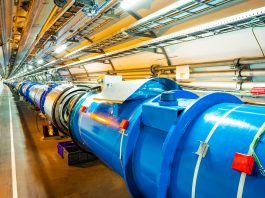CERN has announced new results from the Large Hadron Collider beauty experiment, which if confirmed, would suggest a violation of the standard model of particle physics.
The results of the Large Hadron Collider beauty (LHCb) experiment, announced at the Moriond conference on electroweak interactions and unified theories, strengthen hints of the possibility of a violation of lepton flavour universality.
The measurement made by the LHCb collaboration, compares two types of decays of beauty quarks. The first involves the electron and the second the muon. The electron and the muon, together with a third particle called the tau, are types (or flavours) of leptons.
The SM of particle physics predicts that decays involving different flavours of leptons, for instance the one in the LHCb study, should occur with an equal probability. This feature is known as lepton flavour universality and is usually measured by the ratio between the decay probabilities. In the SM, the ratio should be very close to one.
The new result reveals hints of a deviation from this ratio: the statistical significance of the result is 3.1 standard deviations, which indicates a probability of around 0.1% that the data is compatible with the SM predictions.
Professor Chris Parkes from the University of Manchester and CERN, and LHCb spokesperson, commented: “If a violation of lepton flavour universality were to be confirmed, it would require a new physical process, such as the existence of new fundamental particles or interactions.”
“More studies on related processes are under way using the existing LHCb data. We will be excited to see if they strengthen the intriguing hints in the current results.”
The deviation presented is consistent with a pattern of anomalies recorded in similar processes by LHCb and other experiments worldwide over the past decade. However, these results establish the ratio between the decay probabilities with greater accuracy than past measurements and, for the first time, use all the data collected by the LHCb detector so far.
Going forward, the LHCb experiment is well placed to explain the possible existence of new physics effects hinted at. The LHCb experiment is expected to start collecting new data next year following an upgrade to the detector.









